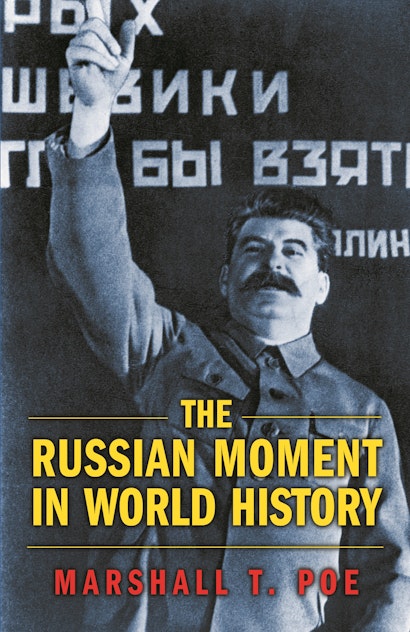Is Russian history one big inevitable failure? The Soviet Union’s demise and Russia’s ensuing troubles have led many to wonder. But this is to look through a skewed prism indeed. In this provocative and elegantly written short history of Russia, Marshall Poe takes us well beyond the Soviet haze deep into the nation’s fascinating—not at all inevitable, and in key respects remarkably successful—past.
Tracing Russia’s course from its beginnings to the present day, Poe shows that Russia was the only non-Western power to defend itself against Western imperialism for centuries. It did so by building a powerful state that molded society to its military needs. Thus arose the only non-Western path to modern society—a unique path neither “European” nor “Asian” but, most aptly, “Russian.”
From the fifteenth to the eighteenth centuries, Russia prevailed despite unparalleled onslaughts by powerful Western armies. However, while Europe nurtured limited government, capitalism, and scientific and cultural revolution, early Russian society cultivated autocracy and command economics. Both Europe and Russia eventually created modern infrastructures, but the European model proved more productive and powerful. The post-World War I communist era can be seen as a natural continuation of Russia’s autocratic past that, despite its tragic turns, kept Russia globally competitive for decades.
The Russian moment in world history thus began with its first confrontations with Europe in the fifteenth century, and ended in 1991 with the Soviet collapse. Written with verve and great insight, The Russian Moment in World History will be widely read and vigorously debated by those who seek a clear and unequivocal understanding of the complex history that has made Russia what it is today.
Marshall T. Poe is the author of several books on Russian history, including A People Born to Slavery: Russia in Early Modern European Ethnography, 1476-1748. He has taught history at Columbia University, New York University, and Harvard University, and is currently an analyst with the Atlantic Monthly.
"If half a millennium of Russian history is to be distilled into a hundred pages of text, one has to have a strong thesis. Poe does. . . If those who disagree can offer a counterargument as compact, vigorous, and accessible as Poe's, the rest of us will greatly benefit."—Foreign Affairs
"Condensing 1,400 years of history into 100 well-argued pages is a remarkable feat, one Poe accomplishes in terse but powerfully stated prose. . . . Poe effectively commits to his chosen path of navigation and distills his observations and vast knowledge into a clear and well-presented theory. The author deserves credit for taking on the gutsy task of re-educating that he sees as a misinformed public with humility intact, an achievement that is a testament to the purity of his intent."—Gabriella Gershenson, San Francisco Chronicle
"Students will find Poe an able provocateur of debate."—Booklist
"This slim volume offers a sweeping yet cogent and highly stimulating reinterpretation of the entire course of Russian history from the time of the earliest settlers in Russian lands to the collapse of the Soviet Union. While intended for general readers, the author's views are firmly grounded in recent scholarship."—Choice
"The task of compressing the whole history of Russia into a hundred easy-to-read pages would be a hard challenge for any serious historian, but the proposition of building and testing in the same space an innovative concept of what Russia is about might seem beyond possible. This neat book by Poe, which many readers would find difficult to put down before turning the last page, is the tangible proof that such a task can indeed by accomplished—and with astounding ease."—Pavel Baev, Journal of Peace Research
"The thesis of this volume is that as late as the fifteenth century Russia was largely irrelevant to world history, that it became a noteworthy player in the sixteenth century, and that it remained so most of the time until 1991."—Richard Hellie, Journal of Modern History
"This unique, interesting, and stimulating book shoehorns the whole of Russian history into a single long essay, one that is argued very forcefully and written with remarkable clarity and verve."—Reginald Zelnik, University of California, Berkeley, author of Law and Disorder on the Narova River
"This is a stimulating and timely essay, which, as intended, is provocative and potentially controversial at every turn."—Simon Franklin, Clare College, University of Cambridge, coauthor of The Emergence of Rus' 750-1200

